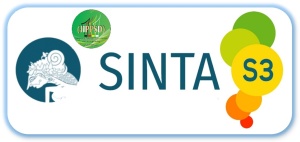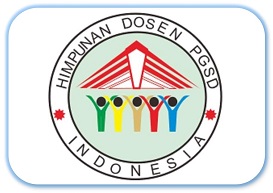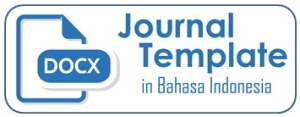Membangun Kredibilitas Manajemen Pendidikan Dasar Melalui Penerapan Artificial Intelligence, Kompetensi Manajemen, dan Etos Kerja
 ), Bambang Ismanto(2), Tita Rosita(3),
), Bambang Ismanto(2), Tita Rosita(3), (1) Universitas Terbuka, Kota Semarang
(2) Universitas Kristen Satya Wacana, Kota Salatiga
(3) Universitas Terbuka, Kota Tangerang Selatan
 Corresponding Author
Corresponding Author
DOI : https://doi.org/10.24036/jippsd.v7i2.125357
Full Text:
 Language : en
Language : en
Abstract
This research presents several findings regarding the minimal use of artificial intelligence, poor school management and low work ethic. The aim of the research is to analyze the application of artificial intelligence, the quality of management competence, and the work ethic of school principals. The research population was 80 teachers (PNS and non-PNS) at the State Elementary School in the Assisted Region 1, Bojong District, Tegal Regency (Diponegoro Cluster). The sampling technique uses saturated samples, so the number of samples is also 80 teachers. The data analysis technique uses descriptive statistics. The research results are that the application of artificial intelligence is in the medium category. The majority of respondents' choice refers to the pleasure of teaching language subjects using the translation method in the high category. The fewest selected indicators from respondents lead to the use of automatic assessment applications in the medium category. Management quality is in the high category. The most answer choices refer to improving the quality of basic education in the high category. The answers to the questionnaire focused at least on the principal's statement of achievement in the high category. The Principal's work ethic is in the high category. The respondents' most chosen answers lead to statements of truth in speaking and fostering cooperation between teachers and staff in the high category. The respondents' least choice refers to concentration at work in the high category.
Keywords
References
Aflah, K. N., Suharnomo, S., Ud, F. M. A. S., & Mursid, A. (2021). Islamic Work Ethics and Employee Performance : The Role of Islamic Motivation , Affective Commitment , and Job Satisfaction. Journal of Asian Finance, Economics and Business, 8(1), 997–1007. https://doi.org/10.13106/jafeb.2021.vol8.no1.997
Ali, S., Payne, B. H., Williams, R., Won Park, H., & Breazeal, C. (2019). Constructionism, ethics, and creativity: Developing primary and middle school artificial intelligence education. International Workshop on Education in Artificiation Intelligence K-12 (EDUAI), 1–4. https://robots.media.mit.edu/wp-content/uploads/sites/7/2019/08/Constructionism __Ethics__and_Creativity.pdf
Ambarita, A. (2020). Pembentukan Kompetensi Pedagogik dan Profesional Guru SD melalui Hybrid Learning pada Pendidikan Profesi Guru Dalam Jabatan. Jurnal Inovasi Pendidikan Dan Pembelajaran Sekolah Dasar, 3(2), 68. https://doi.org/10.24036/jippsd.v3i2.107571
Anwar, M. (2016). Filsafat Pendidikan. Jakarta: Kencana.
Askuri. (2022). Membina Kompetensi Profesional Guru dengan Manajemen Kepala Sekolah. Pekalongan: Nasya Expanding Management.
Batubara, M. H. (2020). Penerapan Teknologi Artificial Intelligence Dalam Proses Belajar Mengajar di Era Industri 4.0 dan Sociaty 5.0. Aceh: IAIN Takengon.
Dehghani, A. (2019). Factors affecting professional ethics development in students : A qualitative study. Journal Original Manuscript, 6(8), 1–9.
Febriana, R. (2019). Kompetensi Guru. Jakarta: Bumi Aksara.
Gafur, A. (2020). Kepemimpinan Kepala Sekolah. Strategi Meningkatkan Etos Kerja Guru Pendidikan Agama Islam. Sidoarjo: Nizamia Learning Center.
Ginting, D. (2016). Etos Kerja Panduan Menjadi Karyawan Cerdas. Jakarta: Elex Media Komputindo.
Hamzah, A. (2019). Etos Kerja Guru Era Industri 4.0. Malang: Literasi Nusantara Abadi.
Hartati, S. (2021). Kecerdasan Buatan Berbasis Pengetahuan. Yogyakarta: Gadjah Mada Universiyi Press.
Huang, J., Salmiza, S., & Yufei, L. (2021). A Review on Artificial Intelligence in Education. Journal of Interdisciplinary Studies, 10(3), 206–2017. https://doi.org/10.23919/INDIACom54597.2022. 9763178
Kaushik, R., Parmar, M., & Jhamb, S. (2021). Roles and Research Trends of Artificial Intelligence in Mathematics Education. Proceedings - 2021 2nd International Conference on Computational Methods in Science and Technology, ICCMST 2021, 202–205. https://doi.org/10.1109/ ICCMST54943.2021.00050
Knox, J. (2020). Artificial intelligence and education in China. Journal Edinburgh Research Explorer, 548–555. https://doi.org/10.23919/MIPRO48935.2020.9245329
Komalasari, K., Arafat, Y., & Mulyadi, M. (2020). Principal’s Management Competencies in Improving the Quality of Education. Journal of Social Work and Science Education, 1(2), 181–193. https://doi.org/10.52690/jswse.v1i2.47
Kompri. (2017). Standarisasi Kompetensi Kepala Sekolah Pendekatan Teori untuk Praktik Profesional. Jakarta: Kencana.
Kusumaningrum, D. E., Sumarsono, R. B., & Gunawan, I. (2019). Professional Ethics and Teacher Teaching Performance : Measurement of Teacher Empowerment with a Soft System Methodology Approach. Journal of Innovation, Creativity and Change, 5(4), 611–624.
Lie, D., Dharma, E., & Sudirman, A. (2019). The Impact of Work Discipline and Work Ethic on the Teacher Performance of Sultan Agung Pematangsiantar Private Middle School Teachers T . A . 2018 / 2019. Journal Of Business Studies, 3(3), 125–135.
Mardati, A. (2021). Peran Guru Dalam Membentuk Karakteristik Siswa (Antologi Esai Mahasiswa Pendidikan Guru Sekolah Dasar). Yogyakarta: UAD Press.
May, L. F., Hariri, H., & Rahman, B. (2020). The Influence of Principal Managerial Competence on Teacher Performance at Schools in Bandar Lampung. Jurnal Keguruan Dan Ilmu Tarbiyah, 5(1), 121–130. https://doi.org/10.24042/tadris.v5i1.5391
Murphy, R. (2019). Artificial Intelligence Applications to Support K–12 Teachers and Teaching: A Review of Promising Applications, Challenges, and Risks. Artificial Intelligence Applications to Support K–12 Teachers and Teaching: A Review of Promising Applications, Challenges, and Risks, January. https://doi.org/10.7249/pe315
Murtiningsih. (2019). The Correlation Between Supervision of Headmaster and Interpersonal Communication. European Journal of Education Studies, 6(1), 246–256. https://doi.org/ 10.5281/zenodo.2649535
Nindie, A. (2022). Leadership Management Of School Principles: A Case Study of Public Elementary Schools in Bogor Regency. Jurnal Mahasiswa Humanis, 2(1), 19–28.
Pasaribu, M. dan A. W. (2022). Artificial Intelligence: Perpektif Manajemen Strategis. Jakarta: Kepustakaan Populer Gramdia.
Purbohadi, D. (2022). Peningkatan Kompetensi Guru pada Pemrograman Robot Artificial Intelligence Artibo. Jurnal Pendidikan Tambusai, 6, 11481–11488. https://www.jptam.org/index.php/ jptam/article/view/4266%0Ahttps://www.jptam.org/index.php/jptam/article/download/4266/3565
Qodirova, F. D. (2021). Technology To Increase the Management Competence of Future Primary School Teachers. Current Research Journal of Pedagogics, 02(08), 27–33. https://doi.org/10.37547/pedagogics-crjp-02-08-08
Santoso, E. J. (2016). Good Ethos. 7 Etos Kerja Terbaik dan Mulia. Jakarta: Elex Media Komputindo.
Shilphy. (2020). Etika Profesi Guru. Yogyakarta: Deepublish.
Subakti, H. (2022). Artificial Intelligence. Bandung: Media Sains Indonesia.
Suwanto. (2020). Budaya Kerja Guru. Lampung: Gre Publising.
Syah, A. (2021). Etos Kerja dan Kepemimpinan Islam. Pasaman Barat: Azka Pustaka.
Yemin, F. K. (2019). Competencies of principals in ensuring sustainable education: Teachers’ views. International Journal of Evaluation and Research in Education, 8(2), 201–212. https://doi.org/10.11591/ijere.v8i2.18273
 Article Metrics
Article Metrics
 Abstract Views : 125 times
Abstract Views : 125 times
 PDF Downloaded : 46 times
PDF Downloaded : 46 times
Refbacks
- There are currently no refbacks.

This work is licensed under a Creative Commons Attribution 4.0 International License.







